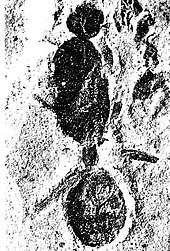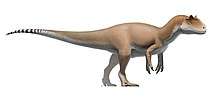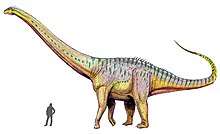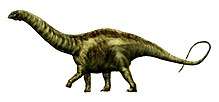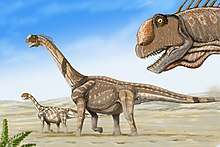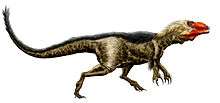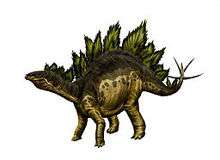1877 in paleontology
Paleontology or palaeontology is the study of prehistoric life forms on Earth through the examination of plant and animal fossils.[1] This includes the study of body fossils, tracks (ichnites), burrows, cast-off parts, fossilised feces (coprolites), palynomorphs and chemical residues. Because humans have encountered fossils for millennia, paleontology has a long history both before and after becoming formalized as a science. This article records significant discoveries and events related to paleontology that occurred or were published in the year 1877.
| |||
|---|---|---|---|
|
Arthropods
Fish
| Name | Novelty | Status | Authors | Age | Unit | Location | Notes | Images |
|---|---|---|---|---|---|---|---|---|
|
gen et sp nov. |
Valid |
One of two stingrays from the Green River Formation |
 Heliobatis radians | |||||
Non-dinosaurian reptiles
| Name | Novelty | Status | Authors | Age | Unit | Location | Notes | Images |
|---|---|---|---|---|---|---|---|---|
|
Junior synonym |
Late Triassic |
A misidentified ornithosuchid archosaur whose name was preoccupied by MacLeay, 1819. It was later renamed Dasygnathoides. Synonym of Ornithosuchus | ||||||
|
Late Triassic |
Dubious genus of misidentified phytosaur. | |||||||
|
Dubious genus of misidentified phytosaur. | ||||||||
Dinosaurs
Laelaps trihedrodon, Cope criticizes Dryptosaurus
O. W. Lucas collected the first remains of what would later in the year be named Laelaps trihedrodon from Quarry I of the Saurian Hill at Garden Park, Colorado.[4] Edward Drinker Cope would describe the material later in the year in a short paper titled "On a carnivorous dinosaurian from the Dakota beds of Colorado."[5] The "Dakota beds" he references are actually Morrison Formation strata.[4] Cope claims to have a skeleton of unspecified completeness on which to establish the new species, but only describes a partial dentary which has 5 successional teeth, 2 functional teeth, and one tooth missing from its socket.[5] All of the preceding material has since been lost to science with the exception of 5 broken, partial tooth crowns.[6] From the now missing dentary, Cope infers that the creature is a carnivore and compares its dentition to that belonging to other members of his infamous genus "Laelaps", L. aquilunguis and L. incrassatus.[5] Cope concludes the paper with a pointed criticism of his rival O. C. Marsh's attempt to rename Laelaps as the genus Dryptosaurus because the generic name Laelaps has been used in entomology.[7] Cope claims that since the mite genus Laelaps was a synonym that the name was not truly preoccupied and Marsh's erection of Dryptosaurus has therefore created a new, redundant synonym of Laelaps the dinosaur.[7] However, subsequent researchers have supported Marsh's new name.
Apatosaurus
- Apatosaurus specimen found with preserved gastroliths.[8]
New genera
|
||||||||||||||||||||||||||||||||||||||||||||||||||||||||||||||||||||||||||||||||||||||||||||||||||||||||||||||||||||||||||
Synapsids
Non-mammalian
| Name | Status | Authors | Age | Location | Notes | Images |
|---|---|---|---|---|---|---|
|
Synonym of Clepsydrops |
||||||
See also
Footnotes
- Gini-Newman, Garfield; Graham, Elizabeth (2001). Echoes from the past: world history to the 16th century. Toronto: McGraw-Hill Ryerson Ltd. ISBN 9780070887398. OCLC 46769716.
- Carpenter, F. M. (1930). "The fossil ants of North America" (PDF). Bulletin of the Museum of Comparative Zoology. 70: 1–66.
- Grande, Lance (1984), "Paleontology of the Green River Formation, with a review of the fish fauna", Bulletin of the Wyoming State Geological Survey, Laramie, WY, 63 2nd ed.
- "Introduction," Chure (2001) page 11.
- Cope (1887) pages 805-806.
- "Description of 5780," Chure (2001) page 11.
- Cope (1887) page 806.
- Cannon (1907). Sanders, Manley, and Carpenter (2001), "Table 12.1" page 167.
References
- Cannon, G.L. (1907). Sauropodan gastroliths. Science 24, 116.
- Chure, Daniel J. (2001). "On the type and referred material of Laelaps trihedrodon Cope 1877 (Dinosauria: Theropoda)". In Tanke, Darren; Carpenter, Kenneth (eds.). Mesozoic Vertebrate Life. Bloomington and Indianapolis: Indiana University Press. pp. 10–18. ISBN 0-253-33907-3.
- Cope, E.D. (1877). On a carnivorous dinosaurian from the Dakota beds of Colorado. Bull. U.S. Geol. Surv. Territories 3: 805–806.
- Sanders F, Manley K, Carpenter K. Gastroliths from the Lower Cretaceous sauropod Cedarosaurus weiskopfae. In: Tanke D.H, Carpenter K, editors. Mesozoic vertebrate life: new research inspired by the paleontology of Philip J. Currie. Indiana University Press; Bloomington, IN: 2001. pp. 166–180.
